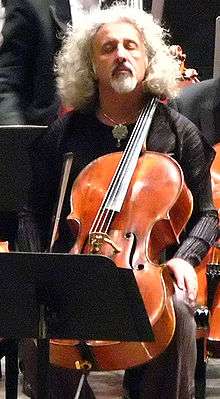Mischa Maisky
| Mischa Maisky | |
|---|---|
 | |
| Background information | |
| Native name | Miša Maiskis |
| Born |
January 10, 1948 Riga, Latvia |
| Genres | Classical |
| Instruments | Cello |
Mischa Maisky (Latvian: Miša Maiskis, Hebrew: מישה מייסקי; born January 10, 1948 in Riga) is a Latvian-born Israeli cellist.
Biography
Maisky is the younger brother of organist and harpsichordist Valery Maisky (1942–).
He began studies at the Leningrad Conservatory and later with Mstislav Rostropovich at the Moscow Conservatory whilst pursuing a concert career throughout the Soviet Union. In 1966 he won 6th Prize at the Moscow International Tchaikovsky Competition. While his debut, at 17, with the Leningrad Philharmonic Orchestra earned him the nickname "Rostropovich of the future", it was in 1966, as prize-winner of the prestigious International Tchaikovsky Competition, that he really started getting noticed. He entered the famous Moscow Conservatory to study with Rostropovich and was quickly taken under the great musician's wing.[1] He emigrated to Israel in 1971, where he holds citizenship. He also studied for a time with Gregor Piatigorsky in Los Angeles. He currently lives in Belgium.
In his performing and recording career, Maisky has worked in long-standing partnerships with artists such as the pianists Martha Argerich, Radu Lupu, and Sergio Tiempo, the violinists Gidon Kremer and Janine Jansen, and the conductors Leonard Bernstein, Zubin Mehta, Vladimir Ashkenazy, Daniel Barenboim, and Giuseppe Sinopoli. Maisky's friendship with Argerich has led to many performances together, such as the world premiere of Shchedrin’s double concerto Romantic Offering in 2011 in Lucerne, Switzerland.[2]
As a Deutsche Grammophon artist during the last 25 years, he has made over 50 recordings, including many with such orchestras as the Vienna Philharmonic, Berlin Philharmonic, London Symphony Orchestra, Israel Philharmonic, Orchestre de Paris, Orpheus Chamber Orchestra and Chamber Orchestra of Europe. Mischa Maisky has the distinction of being the only cellist in the world to have studied with both Mstislav Rostropovich and Gregor Piatigorsky. Rostropovich has lauded Mischa Maisky as "...one of the most outstanding talents of the younger generation of cellists. His playing combines poetry and exquisite delicacy with great temperament and brilliant technique."[3]
In 2003, he performed the Adagio con Variazoni by Respighi and Kol Nidrei, a brilliantly lyrical piece by Max Bruch, at the St. Petersburg Symphony Hall with that Orchestra during the celebration of 300 Years of Music at St. Petersburg, and was warmly received to much applause, repeatedly being called back for bows with the orchestra. [4]
Personal life
Maisky's daughter, Lily Maisky, born in Paris in 1987 and raised in Brussels, is embarking on a career as a concert pianist. Maisky's son, Sascha Maisky, born in Brussels in 1989, is starting on a career as a concert violinist. Lily and Sascha have performed piano trios in public with their father. Maisky also has three other sons Maxim, Manuel and Mateo.
Recordings
Some of Maisky's most noted recordings, out of many, include:[5]
- Bach: Six Suites for Solo Cello BWV 1007–1012 [1985 Recording]
- Joseph Haydn: Cellokonzerte (DG Deutsche Grammophon)
- Brahms: Concertos (DG Deutsche Grammophon)
- Beethoven: Cellosonaten, Op. 5 (DG Deutsche Grammophon)
- Elgar: Cello Concerto; Tchaikovsky (DG Deutsche Grammophon)
- Maisky & Argerich Live in Japan (DG Deutsche Grammophon)
- Rachmaninoff: Elégie (DG Deutsche Grammophon)
Critical reception
There has been much controversy over Maisky's playing. Part of the public criticizes his extensive and often extreme use of vibrato and his generally loud playing.[6] Another part feels that Maisky thus maintains a romantic quality – even when interpreting baroque music – that cannot be found in many other players. For example, a review by BBC Magazine writer Jan Smaczny states that 'Maisky's performance of these works could hardly be bettered. Strauss's Sonata has enormous youthful élan, and the arrangements of the Romance for cello and orchestra and "Morgen" are exquisite. The expertly made Dvorák arrangements fare equally well in fact, the performance of the Sonatina matches the finest violin readings with a superb sense of engagement and ensemble in the faster movements. Excellently recorded, this recital wins on all counts (Morgen! Opus 27, Number 4. 1894, Richard Strauss)'[7]
References
- ↑ "Interview: Mischa Maisky", Retrieved June 6, 2012.
- ↑ "Mischa Maisky – website", Retrieved May 29, 2011.
- ↑ "CONVERSATION WITH MISCHA MAISKY", Retrieved June 10, 2012.
- ↑ "Medici". Retrieved 13 November 2016.
- ↑ "Mischa Maisky – Discography", Retrieved June 10, 2012.
- ↑ Reynolds, Mike (2009-03-24). "Interview: Mischa Maisky on new music, authentic performances and sound quality". MusicalCriticism.com. Retrieved 2014-06-03.
- ↑ "Deutsch Grammophon – Mischa Maisky, Critical Reception", Retrieved June 10, 2012.
External links
- Official Website
- Biographical timeline from Deutsche Grammophon
- IEMEVE.com: Spanish and English, interview and sound bit
- Mischa Maisky tours Southern Africa,1976. Photo dedicated to tour organiser Hans Adler.